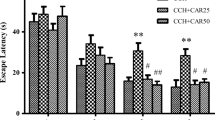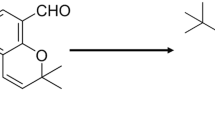Abstract
Objective
To observe the therapeutic effect of Yangxue Qingnao Granule (养血清脑颗粒, YXQNG) on cognitive impairment induced by chronic cerebral hypoperfusion and to investigate its impact on oxidative stress, apoptosis, and the cholinergic system.
Methods
Adult male Wistar rats were subjected to chronic cerebral hypoperfusion by permanent occlusion of bilateral common carotid arteries (2-VO). Thirty rats were randomly assigned to one of the five treatment groups in a 1:1:1:1:1 ratio: sham operation plus normal saline treatment, 2-VO plus normal saline treatment, 2-VO plus YXQNG at a dose of 2 g·kg−1·d−1 or 4 g·kg−1·d−1, or 2-VO plus rivastigmine 2 mg·kg−1·d−1. The Morris water maze test was used to assess the spatial memory retrieval. Apoptosis, total antioxide capacity (T-AOC), acetylcholine esterase (AchE) and choline acetyl transferase (ChAT) activities in the hippocampus and the cortex were investigated.
Results
In the chronic cerebral hypoperfusion model, the 2-VO plus saline treatment resulted in impaired special learning as shown by the significantly prolonged escape latency and shorter swim time in the first quadrant as compared to the sham operation. The impairment was associated with apoptosis and significant decreases in T-AOC, AchE and ChAT activities in the hippocampus and the cortex. Treatment with YXQNG at either 2 g·kg−1·d−1 or 4 g·kg−1·d−1 dose, or rivastigmine resulted in significantly shorter escape latencies and longer swim time in the first quadrant. YXQNG at both doses, but not rivastigmine, had significant reduction in apoptosis, and significant increases in T-AOC and ChAT activity in both the hippocampus and the cortex. Unlike rivastigmine, neither dose of YXQNG showed significant reduction in AchE activity.
Conclusions
YXQNG ameliorated cognitive impairment induced by chronic cerebral hypoperfusion. The protective effect may be mediated through its regulation of apoptosis and activities of T-AOC and ChAT in the hippocampus and cortex of the rats in the chronic cerebral hypoperfusion model, a mechanism that is different from rivastigmine.
Similar content being viewed by others
References
Iadecola C. The overlap between neurodegenerative and vascular factors in the pathogenesis of dementia. Acta Neuropathol 2010;120:287–296.
de la Torre JC. Vascular risk factor detection and control may prevent Alzheimer’s disease. Ageing Res Rev 2010;9:218–222.
Jellinger KA. The enigma of vascular cognitive disorder and vascular dementia. Acta Neuropathol 2007;113:349–388.
Sarti C, Pantoni L, Bartolini L, Inzitari D. Cognitive impairment and chronic cerebral hypoperfusion: what can be learned from experimental models? J Neurol Sci 2002;15:203–204.
Gu XX, Cai DF, Yang YK, Teng Y, Chen YP, Wen M. Study on Yangxue Qingnao Granule in treating chronic cerebrovascular insufficiency. Chin J Integr Med 2005;11:22–26.
de la Torre JC, Fortin T, Park GA, Butler KS, Kozlowski P, Pappas BA, et al. Chronic cerebrovascular insufficiency induces dementia-like deficits in aged rats. Brain Res 1992;582:186–191.
Liu HX, Zhang JJ, Zheng P, Zhang Y. Altered expression of MAP-2, GAP-43, and synaptophysin in the hippocampus of rats with chronic cerebral hypoperfusion correlates with cognitive impairment. Brain Res Mol Brain Res 2005;139:169–177.
Alexopoulos GS, Jeste DV, Chung H, Carpenter D, Ross R, Docherty JP. The expert consensus guideline series. Treatment of dementia and its behavioral disturbances. Introduction, methods, commentary, and summary. J Postgrad Med (Chin) 2005;28:6–22.
Kumar V, Anand R, Messina J, Hartman R, Veach J. An efficacy and safety analysis of rivastigmine in Alzheimer’s disease patients with concurrent vascular risk factors. Eur J Neurol 2000;7:159–161.
Bennett SA, Tenniswood M, Chen JH, Davidson CM, Keyes MT, Fortin T, et al. Chronic cerebral hypoperfusion elicits neuronal apoptosis and behavioral impairment. Neuroreport 1998;9:161–166.
Agostinho P, Cunha RA, Oliveira C. Neuroinflammation, oxidative stress and the pathogenesis of Alzheimer’s disease. Curr Pharm Des 2010;16:2766–2778.
Gironi M, Bianchi A, Russo A, Alberoni M, Ceroni M, Ceresa L. Angelini A, et al. Oxidative imbalance in different neurodegenerative diseases with memory impairment. Neurodegener Dis 2010 (Epub ahead of print).
Jia M, Yang TH, Yao XJ, Meng J, Meng JR, Mei QB. Antioxidative effect of Angelica Polysaccharide Sulphate. J Chin Med Mater (Chin) 2007;30:185–188.
Wang DQ, Wang W, Jing FC, Zhao JN. Effects of tetramethylpyrazine on the extracellular DA, its metabolites and hydroxyl radical in striatum of PD rats treated by L-dopa. Chin Pharm J (Chin) 2007;42:28–32.
Tanaka K, Ogawa N, Asanuma M, Kondo Y, Nomura M. Relationship between cholinergic dysfunction and discrimination learning disabilities in Wistar rats following chronic cerebral hypoperfusion. Brain Res 1996;729:55–65.
Author information
Authors and Affiliations
Corresponding author
Rights and permissions
About this article
Cite this article
Xiong, L., Zhang, Jj., Sun, D. et al. Therapeutic benefit of Yangxue Qingnao Granule (养血清脑颗粒) on cognitive impairment induced by chronic cerebral hypoperfusion in rats. Chin. J. Integr. Med. 17, 134–140 (2011). https://doi.org/10.1007/s11655-011-0643-0
Received:
Published:
Issue Date:
DOI: https://doi.org/10.1007/s11655-011-0643-0




